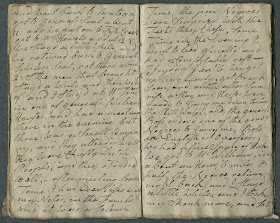 Upstate New York was a hotbed of abolitionism in the nineteenth century, but in the 1780s, when Samson Occom traveled there as an itinerant preacher, slavery was still prevalent. In a diary entry from 1786, Occom describes his journey to Stillwater, a town near Saratoga:
Upstate New York was a hotbed of abolitionism in the nineteenth century, but in the 1780s, when Samson Occom traveled there as an itinerant preacher, slavery was still prevalent. In a diary entry from 1786, Occom describes his journey to Stillwater, a town near Saratoga:Fryday Janr 6 we got up very early, got Break[fast] Soon, and a little after Sun rise, a Slay and Horses were ready to Carry me down towards the Still Water, and, the generl’s Boss orderd one of the genls Negroes to Carry me, Boss in English is Overseers, we had a fine Span of Horses we got to Mr Williams, in a bout an Hour, 6 miles & half, the Negroe return right back, and I Stayd a little while...At this time, the word boss was only just making its way into English from Dutch, and was variably spelled base or bass. The Oxford English Dictionary establishes that the first use of the word in English is from John Winthrop's journal. In a 1635 entry about the construction of a Dutch settlement at the mouth of the Connecticut River, Winthrop notes the arrival of "one Gardiner an expert engineer or work base." The next citation comes from Dutch New Amsterdam, in a letter from Francis Newman, English governor of the New Haven colony, to Peter Stuyvesant, Dutch governor of the New Netherlands. Newman's letter, dated May 24, 1653, was written from "our Place of Residence at the Basses house in the Monhatoes." The OED cites the first modern spelling of boss in a letter written by Washington Irving in 1806: "I had to return, make an awkward apology to boss, and look like a nincompoop" (although nincompoop sounds like another Dutch loan word, its etymology is unknown).
In Cookies, Coleslaw, and Stoops: The Influence of Dutch on the North American Languages, Nicoline van der Sijs notes that in the early American republic, boss was seen as "an alternative to master," which had "hierarchical... [and] negative connotations." John Russell Bartlett's 1848 Dictionary of Americanisms discusses the word's racial and geographical stratification: "The blacks often employ it in addressing white men in the Northern States, as they do massa (master) in the Southern States." Samson Occom, as a Native American preacher visiting white, black, and Indian communities, was likely to have noticed the connotations of different terminology among the people to whom he ministered.
Occom, writing in 1786, found boss a sufficiently unfamiliar term that he was compelled to offer a translation, even in a personal document like his diary. Although eighteenth-century spelling was notoriously variable (Occom occasionally spells the same word several different ways on a single page), this may be the first recorded modern English spelling of boss, predating the OED's citation by over 25 years.
The Occom Circle Project is currently digitizing Dartmouth's Samson Occom letters, diaries and other papers. Until the site is up, you can see this journal as simple page views or ask for DC Hist MS 785665.
hello all,
ReplyDeletewhat a nice job. really so much appreciable blog. I was extremely pleased to find this website. I wanted to thank you for this good knowledge and I definitely enjoying every single small bit of it and I am looking forward to check out new stuff you post.
thanks